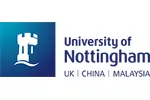

the United Kingdom
University of Nottingham| The award | How you will study | Study duration | Course start | Domestic course fees | International course fees |
|---|---|---|---|---|---|
| PhD | Full-time | 3 - 4 years | September | - | - |
Course overview:
Research carried out in this group falls into four categories:
Applied and Theoretical Probability – mathematical finance; stochastic analysis and diffusions on manifolds; semi-Markov processes; probability inequalities; limit theorems under dependence; stochastic optimal control; Markov decision processes; ion channel models.
Epidemic Modelling – developing and analysing stochastic epidemic models; statistical inference for infectious disease data.
Shape and Image Analysis – statistical shape analysis; object data analysis,including images,functions,trees and manifold valued data; biomedical image analysis.
Statistical Theory and Computation – asymptotic techniques; Bayesian inference; nonparametric methods including empirical likelihood and the bootstrap; saddlepoint approximations; spatial statistics; Markov chain Monte Carlo methods; Laplace transform-based inference; inference for ordinary and stochastic differential equations.
Conferences and seminars:
Postgraduate students are encouraged to participate in the many School research-related activities, and attend appropriate national and international conferences. We also offer a diverse range of research seminars, which you are welcome to attend.
Research students also have access to specialised mathematical training courses such as those provided by the Academy for PhD Training in Statistics (APTS) or the Mathematics Access Grid Conferencing (MAGIC) group who run courses using videoconferencing technology.
Research:
The school has active research groups in many branches of Applied Mathematics (comprising Mathematical Physics and Theoretical Mechanics), Pure Mathematics and Statistics. It is also host to the Centre for Mathematical Medicine and Biology. Much of the research undertaken is multidisciplinary and crosses traditional boundaries.
The taught masters programmes offered in the school have been carefully designed to reflect our research strengths and are being constantly informed and updated by the work taking place in our research groups.
For a more extensive overview, please view the research area on The University of Nottingham online prospectus.
Entry requirements:
The usual minimum requirement for entry is an upper 2nd class honours degree in mathematics (or mathematics related subject) or its equivalent.
International research students need to achieve an IELTS score of 6.5 with no less than 6.0 in each element.The University runs a number of preparatory English programmes each summer and, for extra support during your degree, you can attend its free language classes.
International research students need to achieve an IELTS score of 6.5 with no less than 6.0 in each element.The University runs a number of preparatory English programmes each summer and, for extra support during your degree, you can attend its free language classes. For more information, visit http://www.nottingham.ac.uk/cele/index.aspx
Below are some suggested courses at other providers that you may also be interested in:
Graduate Diploma of Engineering (Industrial Automation) Graduate Diploma
Engineering Institute of Technology
Find out moreGraduate Diploma in Law/Common Professional Examination GDL/CPE Graduate Diploma
Northumbria University Newcastle
Find out moreGraduate Diploma of Public Health and Tropical Medicine Graduate Diploma
James Cook University (JCU)
Find out moreEquine Locomotor Research (GradDip ELR) USA Graduate Diploma
The Royal Veterinary College (RVC)
Find out moreIf you do not meet the entry requirements for this course then consider one of these postgraduate preparation courses from another institution:
Graduate Diploma of Engineering (Industrial Automation)
Engineering Institute of Technology
Find out moreGraduate Diploma in Law/Common Professional Examination GDL/CPE
Northumbria University Newcastle
Find out moreThere are 579 other courses listed from University of Nottingham. A selection of these are displayed below:
Academic English and Study Skills Preparation programmes Master's Qualifying Programme
University of Nottingham
Find out moreAdditive Manufacturing and 3D printing (Centre for Doctoral Training) PhD
University of Nottingham
Find out moreJoin the StudyLink email list and never miss a chance to turn your study abroad dreams into reality!

Find out more about studying in the United Kingdom